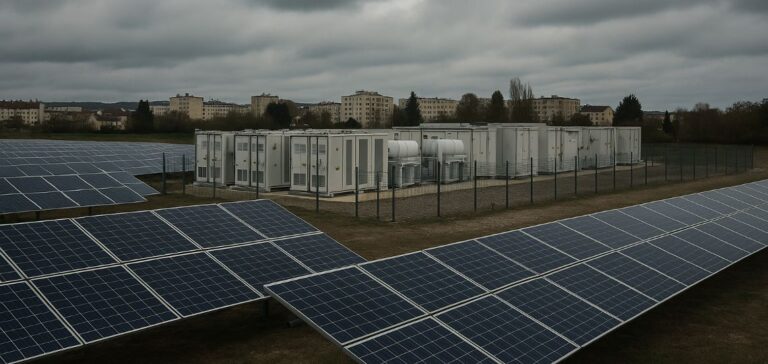The French government is finalising the third edition of the Multiannual Energy Programme (PPE 3), which defines the country’s energy policy roadmap through 2035. This revision signals a strategic shift: ambitions for photovoltaic deployment have been downgraded in favour of increased investment in grid flexibility, primarily through battery storage. The reorientation follows heightened volatility in wholesale electricity prices, which frequently fall to zero during daylight hours due to surplus solar generation unmatched by demand.
Regulatory shift confirmed by S21 decree
The policy change became tangible with the publication of the S21 decree on 27 March 2025, which scaled back public support for photovoltaic systems under 500 kilowatt-peak (kWp). In the absence of guaranteed tariffs, profitability now depends on the ability to self-consume locally generated electricity, while the average market price does not exceed €40/MWh. This regulatory adjustment reflects a context in which solar electricity injected into the grid is increasingly undervalued.
Storage as a lever for value and autonomy
In response to these constraints, battery energy storage has become central to the economic viability of solar projects. It enables electricity to be stored during off-peak periods—especially midday—and dispatched during high-demand intervals, typically in the morning and evening. This load-shifting capability reduces grid reliance and exposure to increases in the Public Electricity Network Usage Tariff (TURPE) as well as excise duties on electricity.
Fiscal inconsistencies affecting electrification efforts
Despite historically high levels of decarbonised electricity production, France remains 60% dependent on imported fossil fuels for its total energy consumption. Nevertheless, the 2025 Finance Bill includes cuts to the electric vehicle purchase bonus and home energy renovation subsidies, while increasing electricity taxes. These fiscal choices appear misaligned with the national objective of electrifying key sectors—transport, heating, and industry—essential to achieving energy autonomy.
Storio Energy adopts a subsidy-free model
Adapting to these new conditions, several sector players are adjusting their economic strategies. Storio Energy, a company specialising in storage solutions for industrial clients, recently commissioned a facility combining a 2 MWp solar power plant with a 2.5 MWh battery. The system achieves an 85% self-consumption rate, covering half of the site’s needs without public subsidies. Jean-Yves Stephan, Chief Executive Officer and co-founder of Storio Energy, stated: “We can build successful photovoltaic projects without government support.”





















